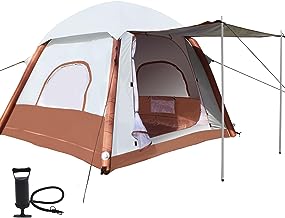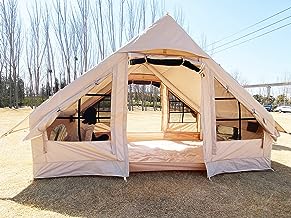Pros and cons of blow up tents
In the world of camping, blow up tents have emerged as a convenient and innovative alternative to traditional tents. These inflatable marvels offer a host of advantages, but like any product, they also come with their own set of drawbacks.
Let’s delve into the pros and cons of blow up tents to help you make an informed decision before setting out on your next outdoor adventure. One of the most significant benefits of blow up tents is their ease of setup.
Gone are the days of wrestling with tangled poles and confusing instructions. With a blow up tent, all you need to do is unpack it from its compact carry bag, attach an air pump (which often comes included), and watch as it rapidly inflates into a sturdy shelter.
This streamlined setup process can be a game-changer for those who prefer to spend more time enjoying nature rather than fumbling with tent components. Additionally, blow up tents are known for their lightweight nature.
Made from durable yet lightweight materials such as ripstop nylon or polyester, these tents are perfect for backpackers or those who frequently change campsites. Their compact design allows them to be easily stowed away in a backpack or carried using attached handles.
This portability factor makes them ideal for hikers who value saving precious ounces in their pack weight without sacrificing comfort and protection. However, like any innovation, blow up tents also have some disadvantages that may make certain campers hesitant to fully embrace them.

One key concern is durability. While modern inflatable technology has improved significantly over the years, there is always a risk that sharp objects or rough terrain could puncture or damage the tent’s structure.
Although most manufacturers provide repair patches and offer warranties against defects, this potential vulnerability should be taken into account when deciding whether to invest in a blow-up tent. Another downside is the reliance on electricity or battery power for inflation purposes.
Unlike traditional tents that require no external sources of energy apart from human strength during assembly, blow up tents need either a power source or a charged battery-operated pump. This dependency on technology may be an inconvenience for campers who prefer to disconnect from the grid and enjoy a more rustic experience.
Additionally, in situations where electricity or batteries are not readily available, setting up and using a blow-up tent becomes challenging. Blow up tents offer a hassle-free setup process and lightweight design that appeals to many outdoor enthusiasts.
However, potential concerns regarding durability and reliance on external power sources should be carefully weighed against these benefits. By considering your specific camping needs and priorities, you can determine whether a blow-up tent is the right choice for your next adventure in the great outdoors.
▪ Pros and cons of traditional tents
Traditional tents, the tried and true shelters that have been a staple of camping for centuries, come with their own set of pros and cons. Let’s delve into these aspects to gain a better understanding. One of the undeniable advantages of traditional tents is their durability.
Made from sturdy materials such as canvas or nylon, they can withstand the harshest weather conditions. Whether it’s heavy rain, strong winds, or even snowfall, these tents are built to keep you safe and dry.
Their robust construction ensures that they can handle rough handling and accidental punctures without compromising their structural integrity. Another benefit of traditional tents is their versatility in terms of size and design options.
From small two-person tents to spacious family-sized ones, there is a wide range available to accommodate various needs. Additionally, traditional tents often feature multiple compartments or rooms, allowing for privacy and organization within the camping space.

This can be particularly useful when camping with a group or family as it provides separate sleeping areas for everyone. However, it would be remiss not to mention some potential downsides associated with traditional tents.
Firstly, setting up these tents can sometimes be time-consuming and require manual effort. Erecting poles, threading through tent fabric, and securely anchoring them to the ground may take some practice or even teamwork compared to the ease of blow up tents’ setup process.
Additionally, traditional tents tend to be bulkier than blow up alternatives when packed away for transportation. This could potentially limit your options if you plan on hiking long distances or have limited storage space in your vehicle.
Furthermore, traditional tents may not offer the same level of insulation as blow up alternatives due to differences in design and materials used. While traditional tents offer durability, versatility in size options, and privacy features; they may require more time and effort during setup compared to blow up alternatives.
Additionally, their bulkiness when packed away might pose challenges during transportation or storage. Consider these factors alongside your camping needs and preferences to make an informed decision on which type of tent suits you best.
▪ Which type of tent is right for you?
When it comes to choosing the right type of tent for your outdoor adventures, several factors come into play. It ultimately boils down to your personal preferences, camping style, and specific needs.
Let’s delve into the different aspects to consider when deciding between blow up tents and traditional tents. One crucial factor to consider is ease of setup.
If you value convenience and efficiency, then a blow up tent might be the right choice for you. These tents typically boast a quick and hassle-free setup process that requires no more than a few minutes.
With their inflatable beams or poles, simply pump them up using an air pump or even manually with your own breath, making assembly a breeze. On the other hand, traditional tents often require time-consuming steps involving assembling poles and attaching various parts together before securing them with stakes.
While this can be seen as part of the camping experience for some, others prefer to spend less time setting up camp and more time enjoying nature. Another aspect to consider is durability and stability.
Traditional tents are known for their sturdy construction and ability to withstand harsh weather conditions such as strong winds or heavy rainstorms. Their solid frames made from materials like aluminum or fiberglass provide excellent stability in adverse conditions.
Blow up tents, though designed with durability in mind, may not offer the same level of robustness as traditional tents. While they are generally capable of handling mild weather conditions well, they may not fare as well in extreme situations where strong gusts of wind could potentially compromise their stability.

Ultimately, determining which type of tent is right for you depends on your priorities during camping trips. If convenience and ease of setup are paramount for you, along with moderate weather resistance capabilities, then a blow up tent might be the perfect fit.
However, if you prioritize sturdiness and resilience against inclement weather conditions over quick assembly times, then a traditional tent would likely be more suitable for your needs. Assess your requirements thoroughly before making a decision, ensuring that the chosen tent aligns with your camping style and the kind of outdoor adventures you embark on.
In a Nutshell
After exploring the pros and cons of blow up tents versus traditional tents, it is evident that both options have their merits. Blow up tents offer convenience, ease of set-up, and portability.
They are perfect for quick getaways or for those who prefer a hassle-free camping experience. On the other hand, traditional tents provide durability, stability, and a more authentic camping feel.
They cater to outdoor enthusiasts who appreciate the ruggedness and sense of connection with nature. Ultimately, the choice between blow up tents and traditional tents depends on individual preferences and specific camping needs.
If you value speed and convenience above all else, then a blow-up tent might be your best bet. It allows you to spend more time enjoying nature rather than grappling with poles and stakes.
Additionally, blow-up tents are great for families or groups who want to camp together but lack expertise in tent assembly. However, if you prefer a sturdier shelter that can withstand varying weather conditions such as strong winds or heavy rain showers, then a traditional tent is your go-to option.
Traditional tents also tend to offer more space and privacy compared to their inflatable counterparts. Whether you opt for a blow up tent or stick with the tried-and-true traditional tent design, remember that camping is ultimately about reconnecting with nature and creating unforgettable memories.
Regardless of which type of tent you choose, embracing the great outdoors with an adventurous spirit is what truly matters. So pack your gear wisely, select the right camping spot that resonates with your soul’s yearning for adventure – be it by a serene lake or amidst towering mountains – and embark on your journey towards an exciting wilderness experience!
Be sure to checkout other cool adult camping stuff at Acme Toy Company Home Page.

